Dangers of Youth
ebook ∣ Age, Criminality, and Juvenile Justice Reform in Third Republic France · States, People, and the History of Social Change
By Briony Neilson

Sign up to save your library
With an OverDrive account, you can save your favorite libraries for at-a-glance information about availability. Find out more about OverDrive accounts.
Find this title in Libby, the library reading app by OverDrive.



Search for a digital library with this title
Title found at these libraries:
| Library Name | Distance |
|---|---|
| Loading... |
French society at the turn of the twentieth century was deeply preoccupied with the conduct and management of its young people, especially those who had broken the law. Legislators and social reformers of the Third Republic grappled with the question of whether children who committed offences should be held criminally responsible for their actions or if their age should exempt them from liability.
Dangers of Youth examines foundational debates – about young lawbreakers, their criminal liability, and their appropriate treatment – at the origins of France's modern juvenile justice system. In a context of overcrowded prisons, frequent recidivism, a sluggish birth rate, and growing international tension, young offenders were viewed as harbingers of the nation's decline and as dangerous agents of disorder. At the same time, young people, including juvenile delinquents, were seen as victims of neglect and necessary vehicles for national regeneration. In 1912 legislators established a distinct criminal justice system for juveniles, enshrining probation at its heart and decriminalizing offences committed by children under the age of thirteen. Legislators drew on recommendations from France's pre-eminent penal reform association, the Société générale des prisons, introducing measures that enabled the state to intervene as never before in children's upbringing.
Dangers of Youth is a detailed historical account of the emergence of greater age consciousness in the criminal justice system in modern France, which contributed to the creation of a distinct branch of justice for juveniles.







